a1 [à] pron. an impersonal pronoun,
usually rendered by the impersonal
“we” in English: a rri ọre ― “we eat
it” i.e. “it is edible.”
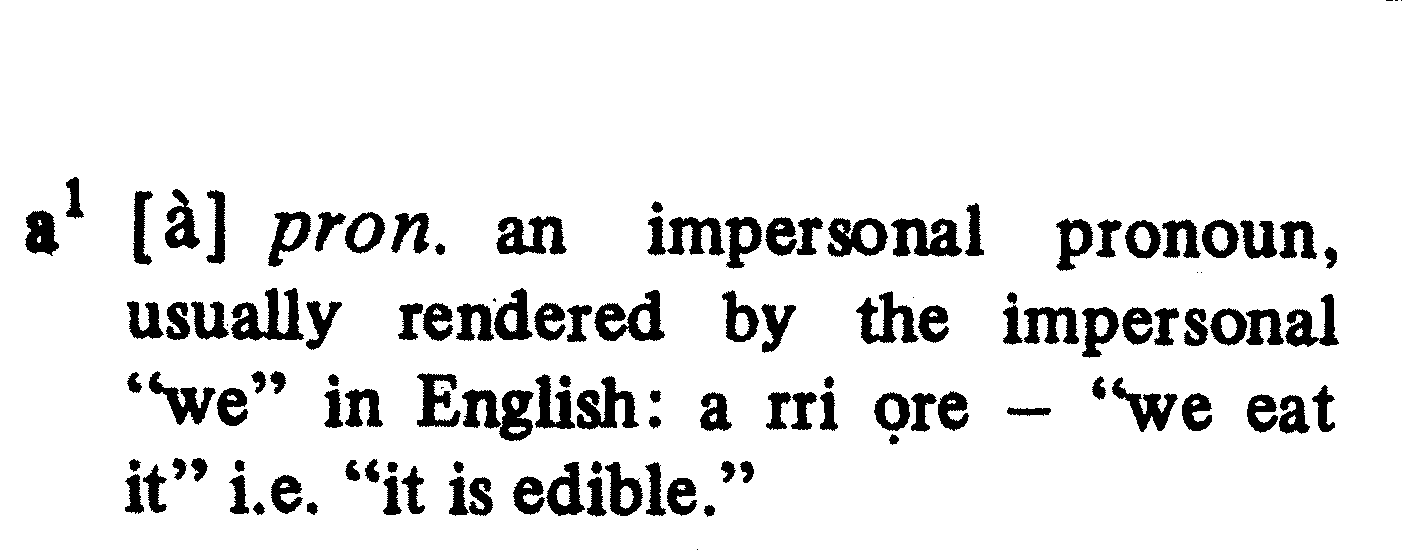
a2 [á] pron. a bound form of the 2nd
per. sgl. pronoun, ruẹ [ `'][rùɛ́]: ọ guaa
< ọ gua ruẹ ― “it accommodated
you”; owaa ọna khin < owa ruẹ ọna
khin ― “Your house this is” i.e.
“This is your house.”
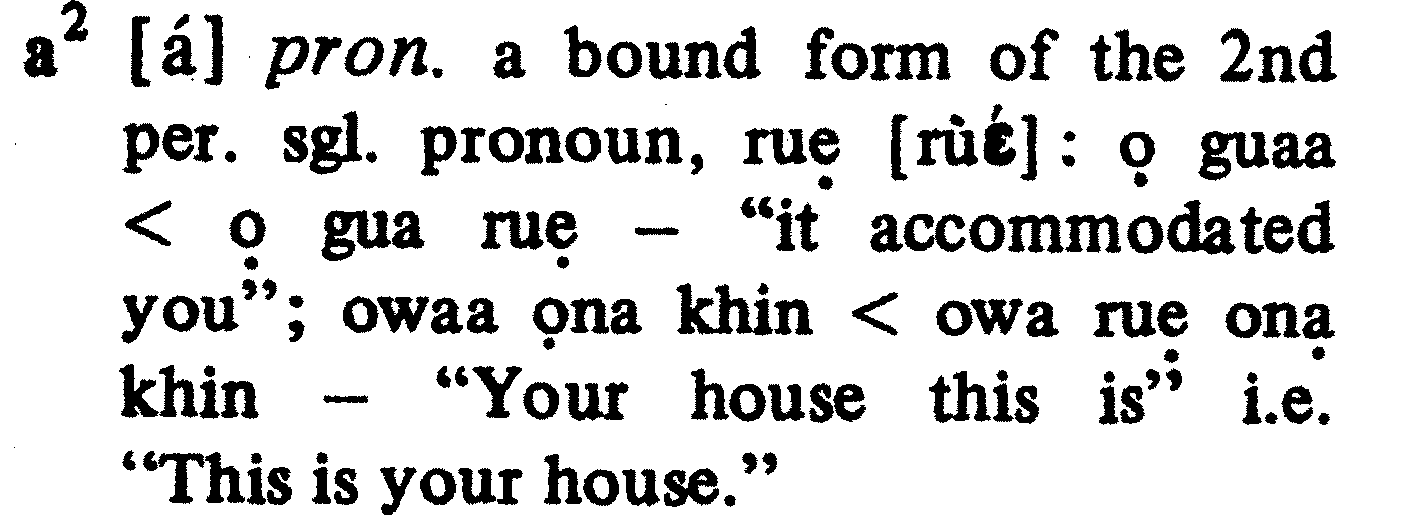
aan [ã̀ã́] int. 1. an exclamation of dis-
belief, surprise or shock; it usually
entails a request for confirmation of
what had been said. Also: aan nia?
2. indicates that an utterance was
either not heard properly or not
understood: Aan, vbua kha hẹẹ? ―
“What did you say?”
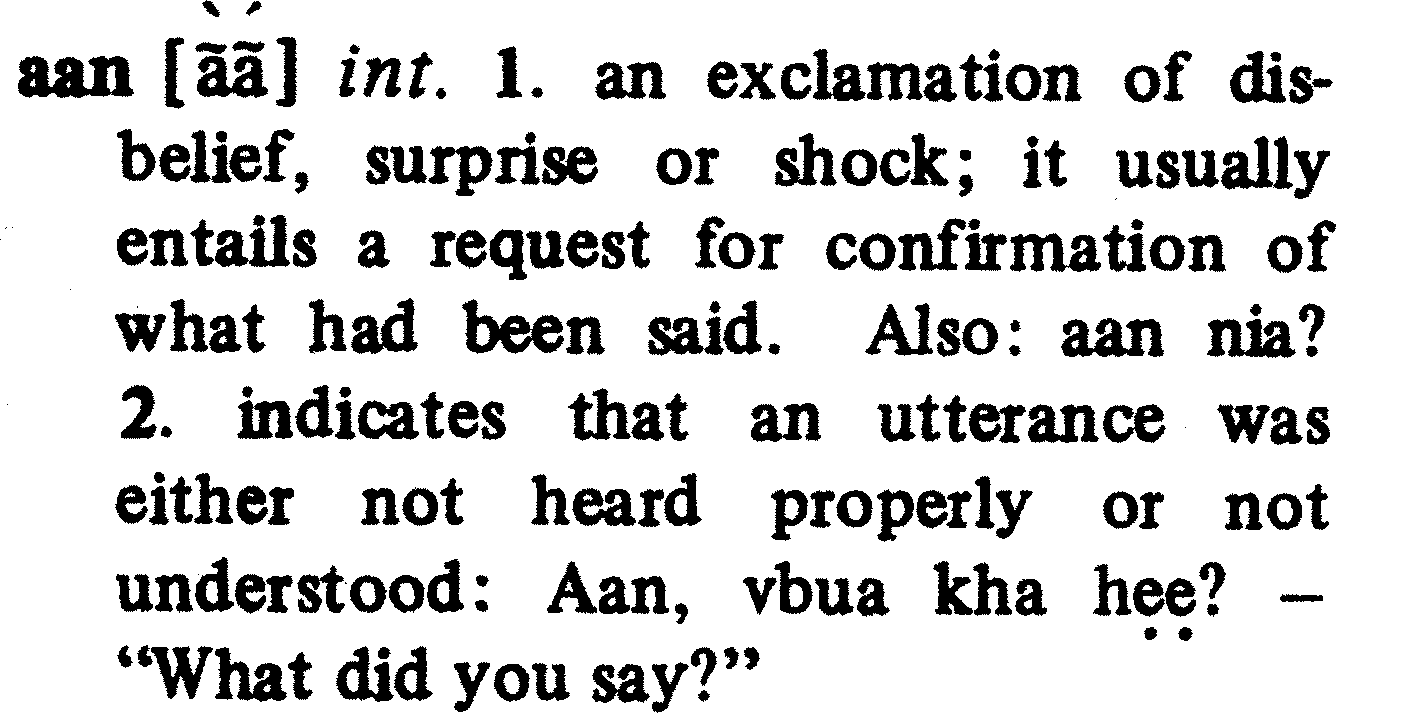
àba [àbá] n. an old-fashioned deferential
address term used for an elderly
male as part of a greeting: “Dọmọ,
aba!”^ ― “Greetings, old father!” (cf.
Esán aba ― “father”).

ába [ábà] n. anklet worn by an ọmada
(palace young male attendant and
sceptre-bearer), also more commonly
known as ẹrọnmwọn.

ababe [àbábè] n. witchcraft practice (cf.
ọmwanbabe).

abakuru [àbákùɽú] n. 1^.^ error, mistake,
oversight. 2. (in the religious sense)
― sin: ya abakuru mwan bọ mwan,
Osanobua ― “Forgive us our sins,
O God.”

aban [ábã̀] n. 1. native hand-cuffs, tra-
ditionally used for restraining prisoners
or mentally deranged persons. 2. a
%%

native-doctor’s implement.

abe [àbé] n. guilt (in a case, or law-
suit): a bu abe gbẹe ― “He was found
guilty”.

abẹe [ábɛ́è] n. 1. pen-knife. 2. native
single-edged knife with a sheath,
used mainly for shaving.

abẹkpẹn [àbɛ̀kpɛ̃̀] n. a special knife
used for slaughtering animals.

abẹmwẹn1 [àbɛ́ɱɛ̃̀] n. stammerer. (cf.
bẹmwẹn).

abẹmwẹn2 [àbɛ́ɱɛ̃̀] n. disputation; qu-
arrelsomeness: Ọ mu abẹmwẹn gbe ―
“She is excessively fond of disputa-
tion”^. (cf: abọ; ẹmwẹn).

abigẹngẹn [ábigɛ̃́gɛ̃́] n. a derogatory
nickname for a very skinny or under-
nourished person.

abodẹ [àbòdɛ̀] n. gnat; a tiny insect
that typically flies into people’s eyes.

abọ [àbɔ́] n. 1. branch, extension:
aberhan (< abọ-erhan) “tree branch”.
2. edge, corner: abiba (< abọ-iba)
“edge of a slab”; abukpọn (< abọ-
ukpọn) “corner of a large cloth”.
Other compounds derived from abọ
include abutete (< abọ-utete) ―
“edge of a hill”; abukpo (< abọ-ukpo)
― “edge of the road”, “curb”; abuhae
(< abọ-uhae) ― “edge of a well”;
abẹvbo (< abọ-ẹvbo) ― “corners of
the town”, etc. 3. strap: abẹkpo
(abọ-ẹkpo) ― “straps of a bag.” 4.
sleeves (of a garment).
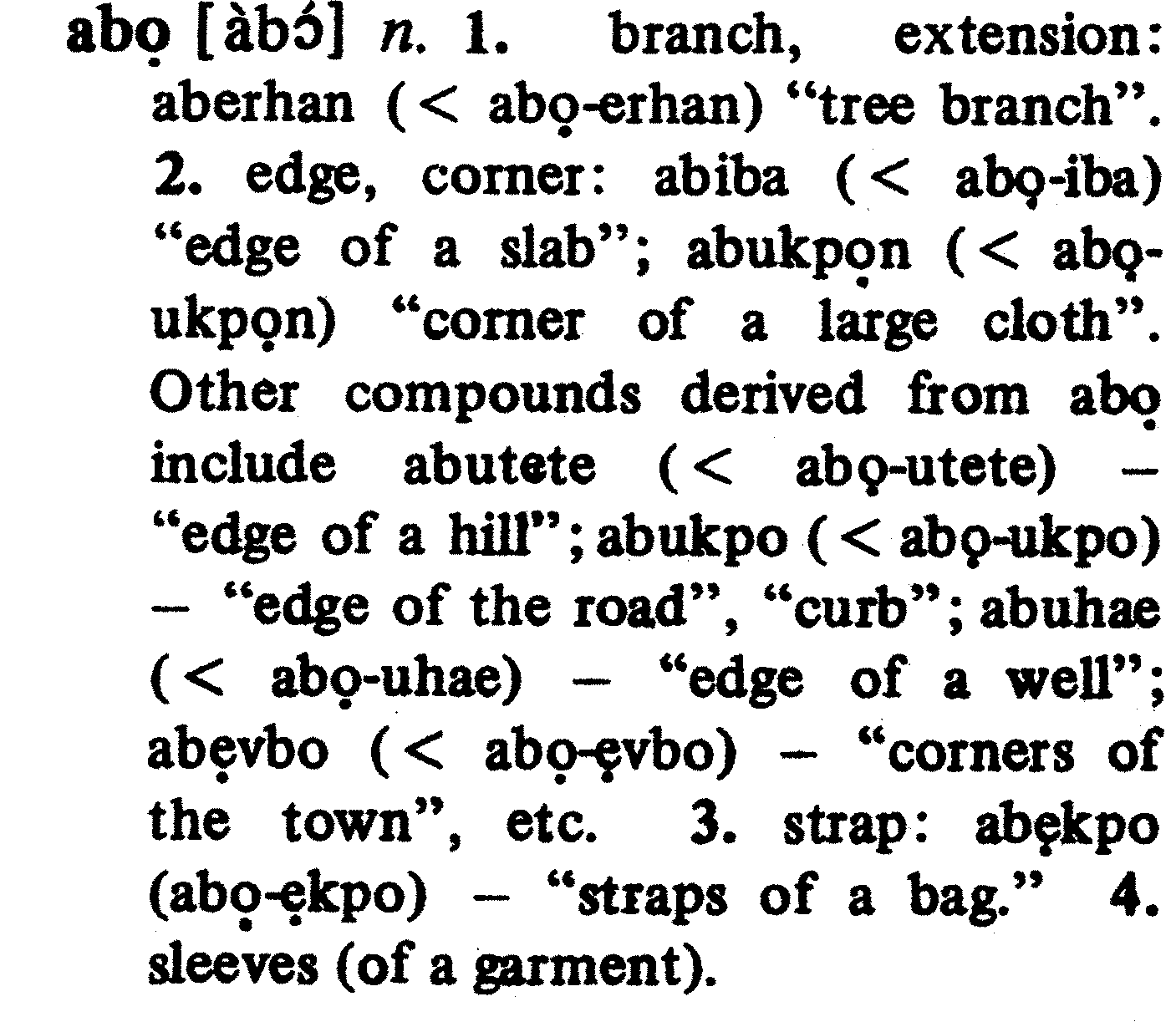
abọ [àbɔ́] n. sane or sober mood; nor-
$Page 002$

malcy. Usually occurs in the expres-
sion ― Ei re ọghe abọ ― “it is not
normal” ― implying that the event or
state is subject to the influence of
some extraneous forces, such as witch-
craft, magic, madness, alcohol, etc.
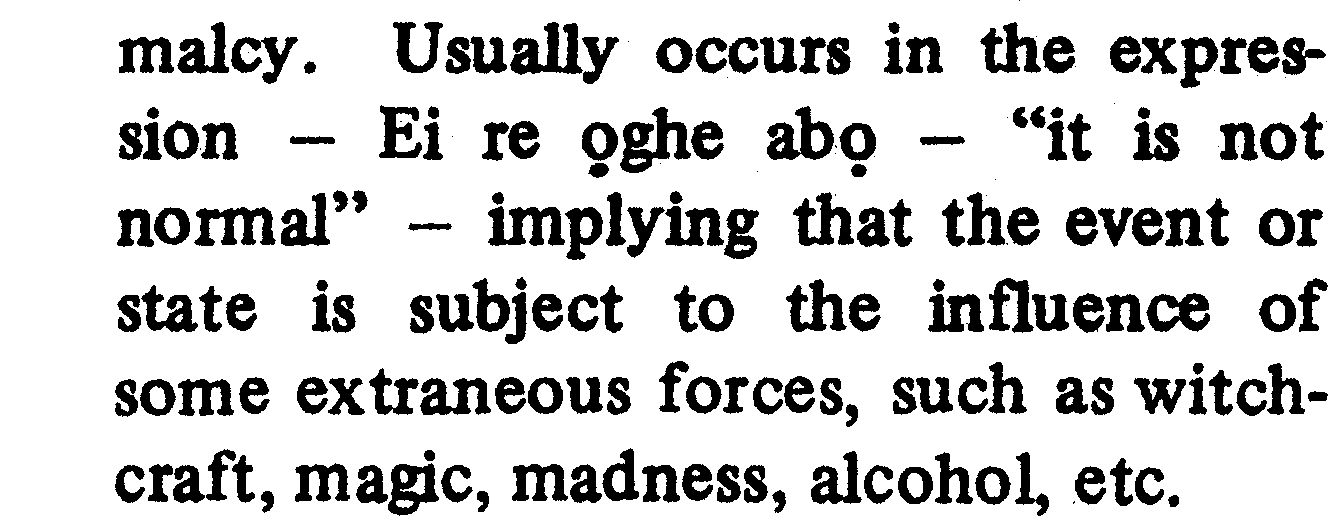
abọkpọ [ábɔ́kpɔ̀] n. a staff carved like
a machet, which is carried by each of
the female relatives of the deceased
during the dances in traditional burial
ceremonies. It is believed to serve
to ward off evil spirits from the family.
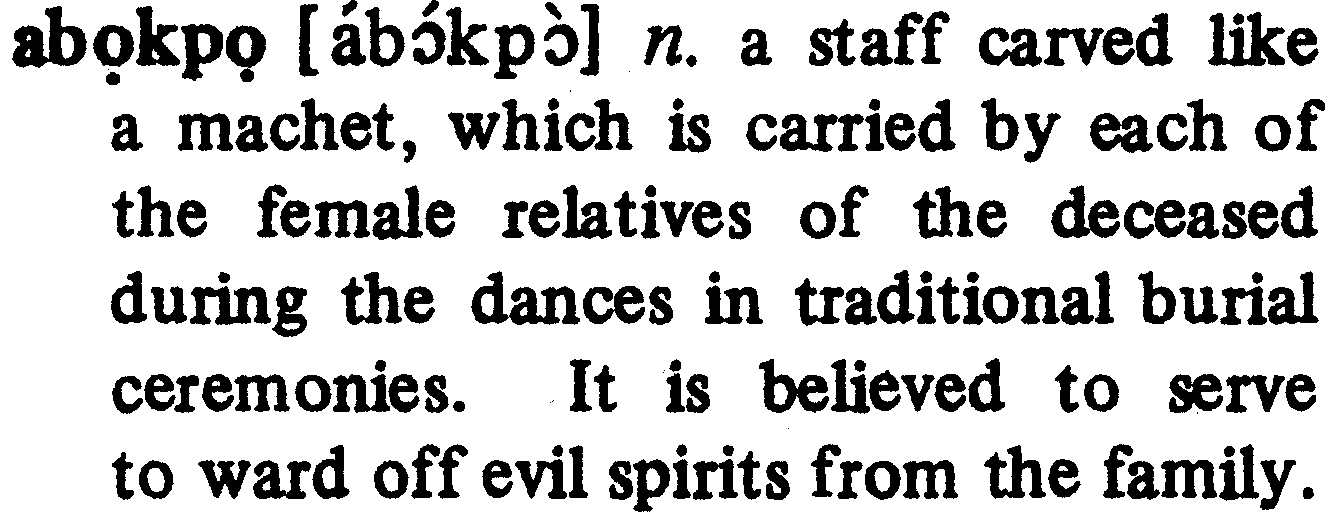
àda [àdà] n. crossroads; road junction.

áda [ádá] n. The sceptre or state-sword
ceremonially borne before the Ọba as
symbol of his royal and imperial
authority. It is also borne before
certain senior chiefs and native re-
ligious priests. (cf. ọmada).
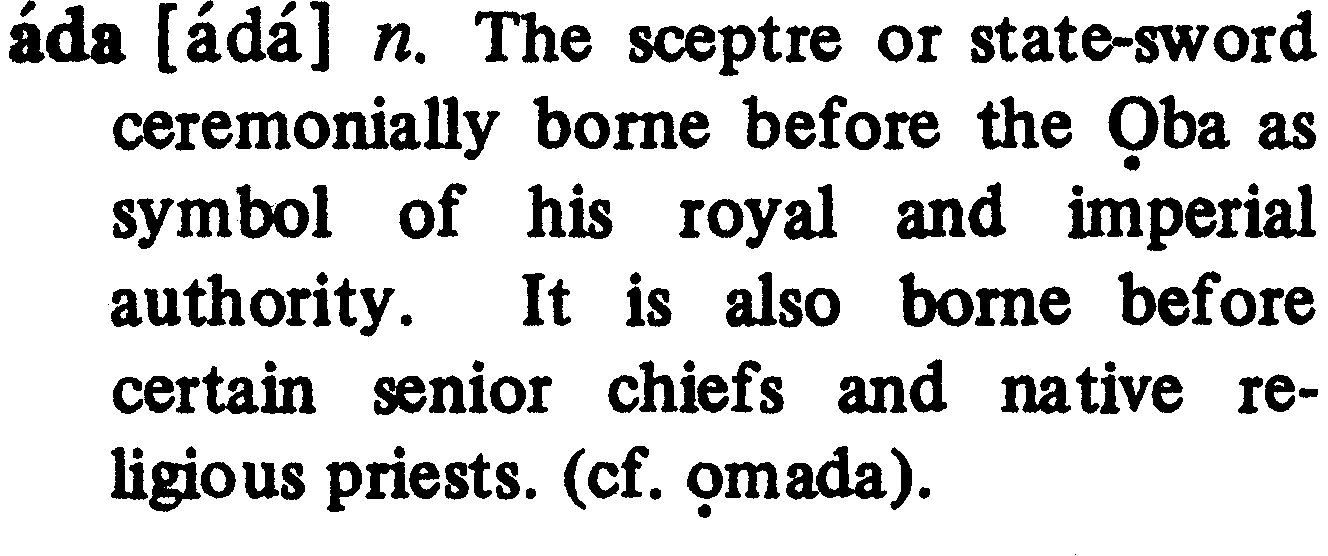
adazẹ [àdàzɛ́] n., adj. an affluent and
respectable person in a community:
Adazẹ-ọmwan nọ ― “He is a respect-
able person”.

adekẹn [àdèkɛ̃́] n. female cricket (cf.
ogoro).

adesẹ [àdèsɛ̀] n. 1. centre, middle: ọ
mudia ye adesẹ ode ― “He stood at
the centre of the road.” 2. between:
ọ mudia ye adesẹ iran eveva ― “he
stood between them both”; (also
adesẹneva). 3. core, kernel: rhie adesẹ
ọre mẹ ― “Give its core to me”.
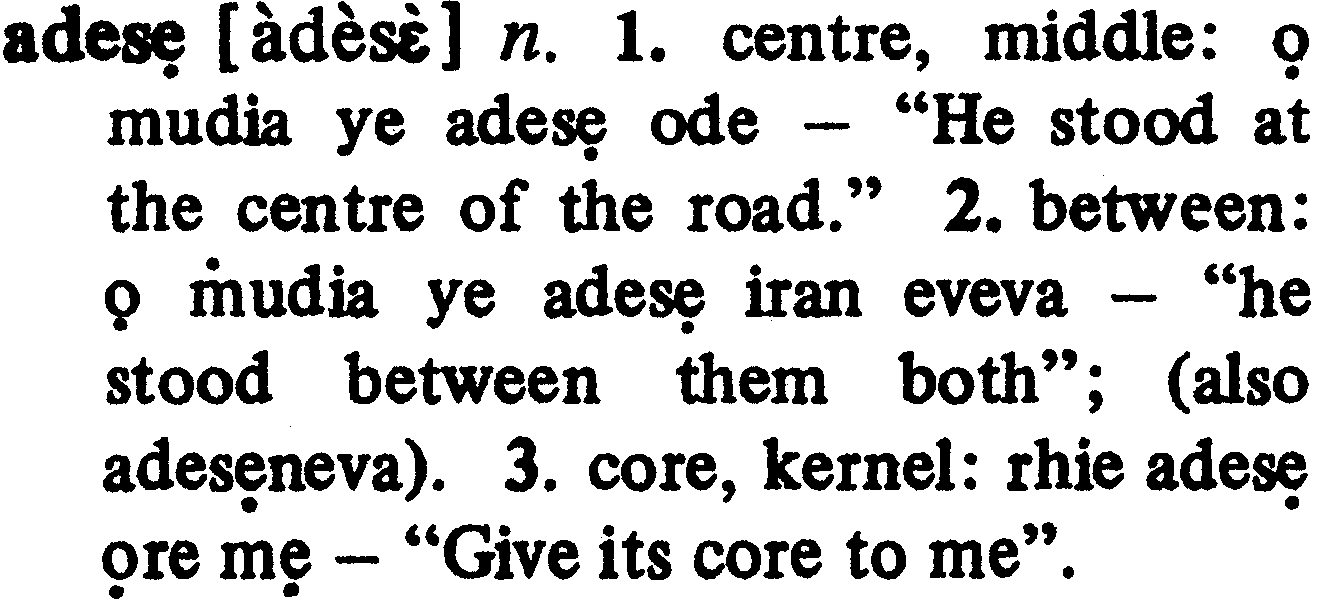
adẹlẹ1 [àdɛ́lɛ̀] n. a square shape.^

adẹlẹ2 [àdɛ́lɛ̀] n. indiscriminate pur-
chases; unnecessary spending; adẹlẹ
bun ẹrrẹn gbe ― “He is too fond of
indiscriminate spending.”

ádẹn [ádɛ̃́] n. a long pole with a hook
at its tip, used for picking fruit from
tall trees.
%%

àdẹn [àdɛ̀] n. placenta; afterbirth.

adiyẹ [ádìyɛ́] n. chicken; fowl (cf.
ọkhọkhọ).

adogbannọ [àdógbã̀nɔ̃̀] n. success; ac-
complishment.

adọlọ [ádɔ̀lɔ́] n. reconciliation.

Adọlọ [ádɔ̀lɔ́] n. name of an Ọba of
Benin who reigned from 1848 ― 1888.
He was the father of Ọba Ovọnramwẹn
(Egharevba: 1968, pp. 46-47).

Aduwawa [àdúwàwà] n. name of an
Edo village on the outskirts of Benin
to the East.

afa [àfá] n. a Moslem priest (cf. Yoruba
“àlùfaá”).

afiala [àfyálá] n. flag.

afian [àfyã́] n. chisel.

afiangbe [àfyã́gbè] n. blessing: afiangbe
Osanobua ― “God’s blessing”.

afianma [àfyã́mà] n. apprehension; fear;
worry: afianma fian mwen ighẹ ọ gha
de ― “apprehension grips me that he
might fall” i.e. I am worried that he
might fall.

afienrhan [afyẽ́řã̀] n. headache.

afiwerriẹ [àfíwèrryiɛ́] n. change, trans-
formation: Arrioba mu afiwerriẹ nibun
rri Ẹdo ― “The government brought
many changes to Benin”.

afọ [àfɔ́] n. 1. greens; vegetable (also
ebafọ). 2. soup prepared from veg-
etables.

afuedẹ [àfwédɛ̀] n. 1. a grey-haired
person. 2. an old person.
$Page 003$

afuozu [àfwózú] n. a blind person (cf.
arhuaro).

aga [ágá] n. chair.

agalezi [àgàlèzí] n. 1. a young lizard.
2. a nickname for a tall and clumsy
person.

agan [àgã̀] n. 1. a childless woman; 2.
an infertile person or plant.

aganmwinsoso [àgã́ɱĩ̀sósó] n. a se-
rious case of whitlow, believed to be
caused by the poison of a certain kind
of caterpillar known as “isue”.

agele [àgèlè] n. bullet.

agiẹghẹ [àgyɛ́ɣɛ̀] n. coins used as small
change; change (in monetary trans-
actions).

agikpa [àgìkpá] n. an adult male; a
full-grown male: ọ khian agikpa nẹ
― “He has become a full-grown person
already.”

agiẹn [agiɛ̃́] n. corrosive acid.

agiẹngiẹn [ágyɛ̃́gyɛ̃́] n. sensitivity; con-
cern; interest: agiẹgiẹn ọmọ i giẹe kpa
se iran rae ― “Her motherly concern
will not let her desert them.”

agio [àgyó] n. a kind of root dye that
changes white cloth, or similar ma-
terials, to yellow.

agobọ [àgóbɔ̀] n. left hand side; left
hand.

agọ [àgɔ́] n. camp; temporary settle-
ment.

aguegbero [àgwégbeɽò] n. 1. being in
agreement, matching each other. 2.
(in mathematics): equivalence: con-
gruency.
%%

aguẹ [àguɛ̀] n. a seven-day fast held at
the Oba’s palace, as well as at the
households of some senior chiefs. It
is usually held in January after Iguẹ
festival.
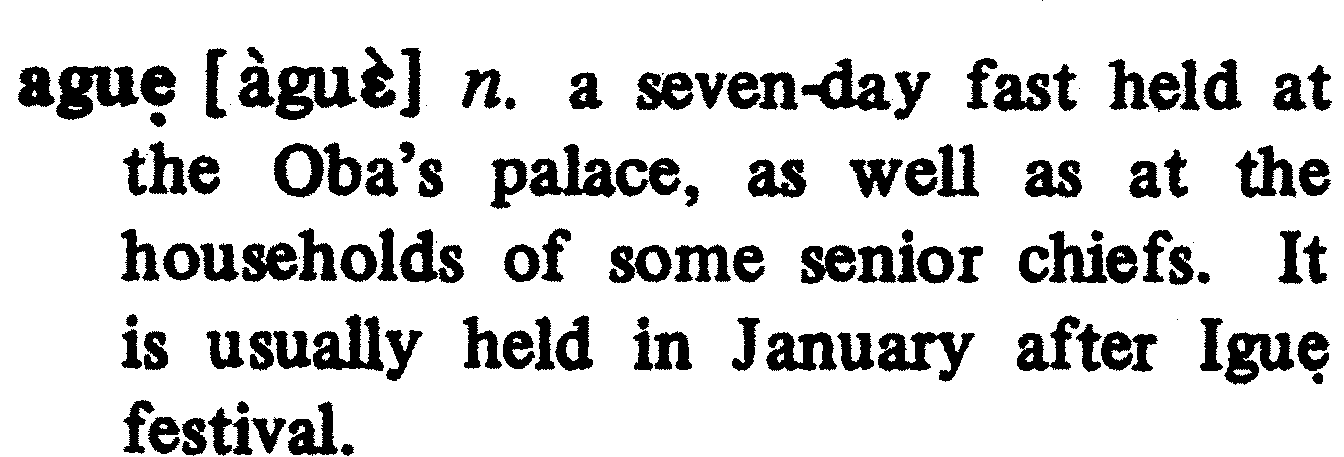
agukisinmwiongie [àgúkísĩ́myṍgye] n.
the morning star. Its name no doubt
derives from its extreme brightness:
(< a-gue-uki-sinmwin-ogie ― “that
who with the moon struggles for
supremacy” i.e. the moon’s rival).
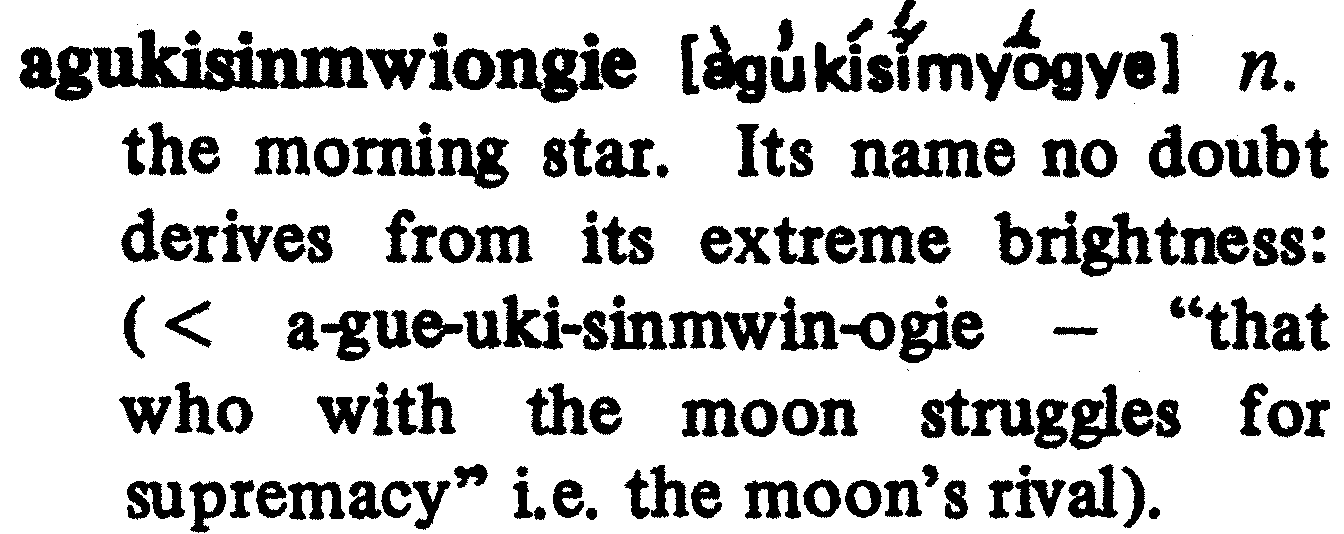
aguobegbe [àgwóbegbè] n. compatibi-
lity; having mutual accord; harmony.

aguro [àgúɽò] n. correspondence;
match.

àgbada [àg͡bàdà] n. a two-edged sword
used mainly by butchers.

ágbada [ág͡bádá] n. the large and flow-
ing outer robe of men’s Nigerian
national dress.

agbadi [àg͡bàdì] n. bridge (Melzian).

Agbado [àg͡bàdò] n. name of one of
the oldest native markets of Benin
City, situated along Akpakpava Road.

agbaka [àg͡bákà] n. crocodile.

agbakpan [àg͡bákpã̀] n. a bald person.
(cf. akpan).

agban [àg͡bã́] n. wicker basket with a
wooden base, used mainly for con-
veying foodstuffs.

agbanmwẹn [àg͡bã̀ɱɛ̃̀] n. chin; lower
jaw.

agbaziro [ág͡bàzíɽò] n. confidant; one
with whom one confers.

Agbaziro [ág͡bàzíɽò] n. name of one of
the local government areas in the
$Page 004$

Esan-speaking part of Bendel State.

agbegue [àg͡bégwe] n. covering up;
making secret.

agbeva [àg͡bèvà] n. something made up
of two components; dual; twin.

agbẹn [ág͡bɛ̃́] n. 1. line, row. 2. course,
route.

agbẹtẹ [àg͡bɛ́tɛ̀] n. one afflicted with
one or more body ulcers, especially
on the legs.

agbo [àg͡bò] n. ram.

Agbodo [àg͡bódó] n. 1. the name of a
lake in Ugo. 2. general term for a
cave or any deep and wide hollow
in the ground.

Agboghidi [ág͡bóɣìdì] n. the name of
a famous and historic ruler of Ugo.

agbọkhokho [àgbùxòxò] n. hornet.

agbọn [àg͡bɔ̃̀] n. 1^.^ the world, the uni-
verse; mortal life, as opposed to the
immortal realm of spirits. 2. a col-
lective reference to the people of
the earth.

agha [àɣá] n. a wood-carver’s imple-
ment.

aghadaghada [àɣàdàɣádà] n. Each of
the four lines constituting the cross
(+) configuration has in the Edo game,
Isẹ. The significance of aghadaghada
in the game derives from the mystical
meaning of the + symbol.
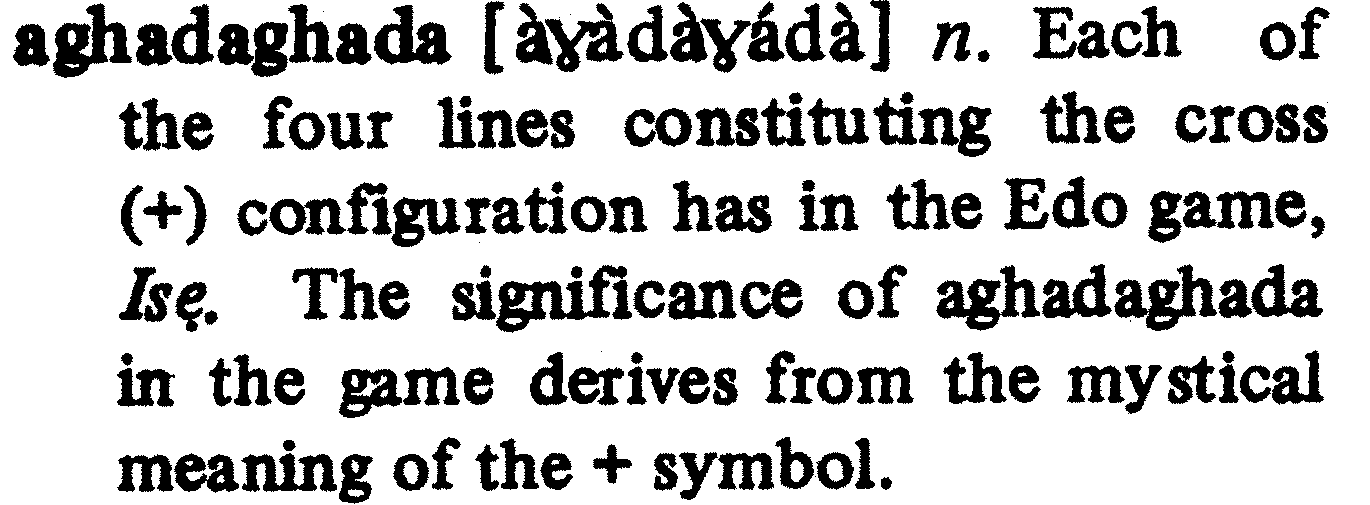
aghanghan [áɣ̃ã́ɣ̃ã́] n. a very high
price; expensive value: aghanghan ẹre
i hae ye owa nii ― “It was a very
high price that I paid for that house.”

aghẹn [àɣ̃ɛ̃̀] n. native mat made from
%%

strips of the pulpy stem of “ẹkpogho”
plant.

aghọnghọn [áɣ̃ɔ̃ɣ̃ɔ̃̀] n. shadow.

aha [àhá] n. leech.

ahannọzẹ [àhã̀nɔ̃̀zɛ́] n. a select group;
an exclusive group.

ahẹ [áhɛ̀] n. convulsion (typically af-
flicts infants).

ahẹn [áhɛ̃́] n. sieve.

ahianmwẹn [áhyã́ɱɛ̃̀] n. bird; ahi-
anmwẹn-Osa ― “the African Pied
wagtail”.

ahiọ [àhyɔ́] n. urine.

aho [àhó] n. hoe.

ahobẹkun [àhóbɛ̀kṹ] n. state of being
lost or irrecoverable.

ahoẹmwẹn-egbe [àhwɛ̀ɱɛ̃égbé] n.
mutual love; caring for each other.

ahoẹmwọnọmwan [àhwɛ̀ɱɛ̃́ɔɱã̀] n.
love, amity; goodwill.

ahoo [àhòó] n. goodwill, benevolence.

ahua [áhúà] n. hawk.

ahuẹmwẹn [àhwɛ́ɱɛ̃̀] n. trouble-
maker; (also aruẹmwẹn).

aibanuafo [àíbã̀nũã́fòó] n. small
under-garment worn by men.

airebaa [àíɽébàá] n. very potent
poison, hence its name which literally
means “one-does-not-eat-in-addition-to
-it”.

aitalọ [áytàlɔ́] n. sore-throat (also
atalọ).
$Page 005$

áka [ákà] n. a common kind of grass
snake.

àka [àká] n. a shelf over the traditional
kitchen hearth used for drying meat
and fish and for preserving other
ingredients such as crayfish, etc.

aká [áká] n. trumpet.

akaba [àkàbà] n. a ritual dance which
forms part of the Ọkhuahẹ festival.

Akaẹrọnmwọn [ákaɛ́ɽ̃ɔ̃̀ɱɔ̃̀] n. The
Palace Court Jester.

akasan [àkàs̃ã́] n. corn pudding, usual-
ly dispensed in molds wrapped in
special leaves known as ebiẹba
[` '` '][èbíɛ̀bá].

akanmwundu [àkã̀ɱũ̀dù] n. a dimuni-
tive object. (cf. kanmwan).

akeegbe [àkèègbé] n. a pretentious
person.

akenni [àkẽ́nì] n. ivory (< akon-eni)
“elephant’s tooth” (cf. akọn).

Akẹngbuda [àkɛ̃́gbúdà] n. the name
of the Oba of Benin who reigned from
1750 to 1803 (Egharevba 1968: p. 74).

Akẹnzua [ákɛ̃́zuà] n. the name of two
past Obas of Benin: Akenzua I 1713
to 1734 and Akenzua II 1933 to 1978.

akia [ákià] bound morpheme. month;
it occurs with numerals to express
monthly periods of time; e.g. ákiàhá
= three-month period; akiaihinrin =
nine-month period.

akiyẹyẹ [ákíyɛ̀yɛ́] n. foolery, joke.

áko [ákò] n. a fruit tree (Dennettia
tripetala), whose fruit is peppery-hot
when ripe, and is very popular and
%%

used as a hospitality gift.

àko [àkò] n. gift parcel; present; (also
oko).

àko [àkò] n. 1. normal location; place
2. enclosure; bag; case; sheath: àkoọmọ
― “the case for a child”: womb.

akobẹ [àkòbɛ̀] n. metal trap, used main-
ly for catching small animals such as
house mice.

akobiẹ [akobyɛ̀] n. a mud idol moulded
in human shape.

akoọmọ [àkwọ́mọ̀] n. womb (cf. àko).

akota [àkòtà] n. evening time: from
about 4 p.m. to nightfall; akota
khuẹrhẹẹ ― “late evening”.

akọn [àkɔ̃̀] n. tooth; akingho (akọn-
ighó) “milk teeth”.

akọsọ [ákɔ́sɔ́] n. a thorny creeper
(Uvaria macrotricha).

akọwe [ákɔ̀wé] n. clerk. (cf. Yoruba:
akọwe).

akuenrhankuinrri [ákw̃éřã́kw̃ĩ̀rì] n.
pupa encased in a shell of twigs and
strings.

akuete [àkwétè] n. 1. something of tre-
mendous size or quality: amẹ akuete
ẹre ọ rhọre ― “It was an extraordin-
arily heavy rain that fell.” 2. the
name of a woven fabric made in
Ghana.
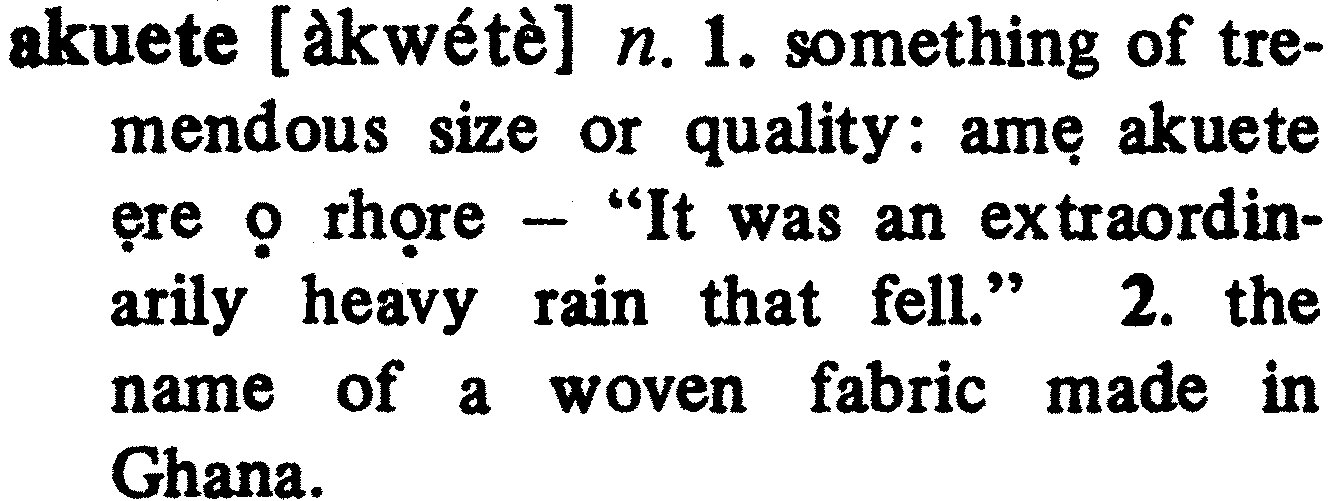
akugbe [àkúg͡bè] n. unity; accord;
akugbe nọhuanrẹn ― “Holy Com-
munion”.

akughagha [àkúɣàɣà] n. tree bear.

akuirọn [àkwíɽ̃ɔ̃̀] n. a dark-brown bird
$Page 006$

with fluffy plumage.

akha [àxà] n. weaver bird.

akhaẹn [àxãɛ̃̀] n. stinginess.

akharha [àxàřà] n. crutch; also a
euphemism for the genitals.

akharho [àxářò] n. a variety of mon-
key.

akhasẹ [áxasɛ̀] n. prophet.

akhe [àxé] n. a clay pot usually used
for drinking water.

akhiẹ [àxyɛ̀] n. mourning.

akhiọnkpa [àxĩɔ̃̀k͡pà] n. loner (also
okhiọnkpa).

akhọnmiotọ [àxɔ̃́mĩ̀ṍtɔ̀] n. success,
fulfilment, victory.

akhọwa [àxɔ̀wà] n. 1. night-watchman;
security guard. 2. deputy.

ákhuankhuinsan [áxw̃ãxw̃ĩsã̀] n. dung-
beetle.

akhuanwa [áxw̃ã́wà] n. wall ghecko.

akhuarhamwunnu [áxwáráɱũ̀nṹ] n.
lips.

ákhuẹ1 [áxwɛ̀] n. marble.

ákhuẹ2 [áxwɛ̀] n. tomorrow.

àkhuẹ [àxwɛ́] n. wash; bath.

akhuẹn [áxwɛ̃́] n. joint.

akpá [àk͡pá] n. 1. foetus; 2. spirit.

akpà [àk͡pà] n. a foolish person.

akpakomiza [àk͡pàkómìzà] n. hyena.
%%

akpakpa [àk͡pák͡pà] n. spider.

Akpakpava [àk͡pàk͡pávà] n. the name
of one of the streets in Benin City,
it leads from the Ring Road to Ikpoba
Slope.

akpalakperhan [àk͡pàlàk͡pèřã́] n. Grey
woodpecker.

akpalode [àk͡pálódè] n. a belt worn as
a protection against evil forces and
charms.

akpan [ák͡p̃ã́] n. baldness; bald head (cf.
agbakpan).

akpannago [àk͡p̃ã̀nã́gó] ?. left-handed
person.

akpata [ák͡pátá] n. an indigenous mu-
sical instrument that is played like a
harp.

akpanmwunse [àk͡p̃ã̀ɱũ̀sè] n. eczema.

akpannigiakọn [àk͡p̃ã̀nigyakɔ̃̀] n. sore-
gums; infected gums.

ákpáwè [ák͡páwɛ] adv. “were it that
. . . ” e.g. akpawe i mwẹn igho, i gha
dẹ imọto ― “were it that-I-had-money,-
I-would-buy-a-car: if I had money,
I would buy a car.”

akpẹlẹ [àk͡pɛ̀lɛ̀] n. a woman pregnant
for the first time.

akpo [àk͡pò] n. a nickname for a very
short person.

akpolo [àk͡pólò] n. a string of beads
worn around the waist by girls.

akpọkọ [ák͡pɔ́kɔ́] n. a variety of na-
tive pepper that’s very small and hot.

Akpọlọkpọlọ [àk͡pɔ̀lɔ̀k͡pɔ́lɔ̀] n. one
of the praise titles of the Ọba of Benin:
$Page 007$

Ọmọ n’Ọba n’Ẹdo, Uku Akpọlọkpọlọ.

alagbodẹ [àlág͡bòdɛ̀] n. the last born
of a woman. lit. meaning: “one who
passes and blocks the way.”

alaghodaro [àláɣòdárò] n. progress; im-
provement.

alama [àlàmà] n. meddling (cf. igbal-
ama).

alasẹ [àlásɛ̀] n. carelessness/irresponsi-
bility: ọ ya igho fi alasẹ gbe = he-uses-
money-make-carelessness excessively
i.e. “he is too careless with money.”

alazi [álázi] n. ape.

alele [àlélè] n. procedure; established
way of doing things; (also ilele ).

alẹlẹ [álɛ̀lɛ̀] n. a creeper that’s mainly
used for tying yam.

alẹvbẹ [àlɛ̀ʋɛ̀] n. a bat-like night bird
that flies only a short distance when
stirred.

alimoi [àlìmoí] n. orange; alimoi-
negiere-lime.

alubarha [àlùbářà] n. onion; (Yoruba:
àlùbọ́sà).

alughaẹn [àlúɣã̀ɛ̃] n. difference.

alumagazi [àlùmàgázì] n. a pair of
scissors; (cf. Yoruba: àlùmɔ́gàjí) (also
ugbeto; etuheru).

alumẹ [àlùmɛ̀] n. a bird.

alumiọghọn [alumyɔ̃́ɣɔ̃̀] n. the smooth-
skinned lizard, which is also smaller
than the normal lizard.

ama1 [ámã̀] n. 1. mark: ọ vin ama yọ
― “he drew a mark on it”; 2. sign,
%%

symbol: ama emwin nodee ọna khin
(the sign of thing coming this is)
“this is a sign of things to come.”

ama2 [ámã̀] n. a bronze or brass cast-
ing: Iran sa ọre ye ama ― “They cast
it in bronze/brass.” i.e. “They im-
mortalized it.”

amamẹ [àmã́mɛ̃] adj. watery:
uwọnmwẹn amamẹ ẹre ọ lee ― It
was a watery soup that she cooked.
(cf. amẹ).

amazẹ [ámazɛ̀] n. carved or moulded
figurines in a shrine.

ameda [àmédà] n. rain-water (collected
from a drainage tunnel on a roof, or
as it flows down the roof). (cf. amẹ;
eda).

amerhẹn [àméřɛ̃̀] n. hot water (cf. amẹ;
erhẹn).

ameve [àmévè] n. tears (cf. evé).

amẹ [àmɛ̃̀] n. 1. water. 2. rain: amẹ
rhọọ ― “Rain is falling”. 3. liquid: ọ
de amẹ ― “It has liquified”. 4. juice:
amẹ alimoi ― “orange juice”.

amẹmẹ [ámɛ̃̀mɛ̃̀] n. a tree whose leaves
have sandy surfaces like sandpaper.
(cf. ebamẹmẹ), and is usually used
for polishing wooden surfaces.

amẹzẹ [àmɛ̃́zɛ̀] n. stream water (be-
lieved to be very cool): Ọ furre vbe
amẹzẹ ― “It is cool like stream water”.

amiẹkue [àmyɛ̃́kwè] n. concession;
admission as accurate or true.

amivin [àmĩ́vĩ̀] n. coconut milk.

amolokun [àmṍlókũ̀] n. sea-water. (cf.
Olokun).
$Page 008$

amọgba [àmɔ̃̀g͡bà] n. pipe-borne water.

amuẹtinyan [àmwɛ̃́tĩỹã̀] n. faith,
trust.

amufi [àmũ̀fì] n. acrobats who used
to perform at the isiokuo ceremony.

amunu [àmṹnũ̀] n. verbal abuse or
insult.

amuro [àmṹɽò] n. sympathy, considera-
tion.

amurhukpa [àmṹřùkpà] n. kerosine.

amwenbọ [áɱẽ̀bɔ́] n. favourite wife.

amwẹn [àɱɛ̃̀] n. 1. female; 2. wife.

amwọnba [áɱɔ̃́bá] n. 1. wife of the
Ọba of Benin (also oloi); 2. wife of
a ruler.

anini [ánĩ́nĩ́] n. an old Nigerian coin
that was worth 1/10 of a Kobo.

apiẹntisi [àpỹ́ɛ̃́tisì] n. 1. apprentice
driver. 2. apprentice in general. (cf.
Engl.).

araba [áɽábà] n. 1. rubber. 2. plastic
wares (cf. Engl.).

áranmwẹn [áɽ̃ã́ɱɛ̃̀] n. tongue.

àranmwẹn [àɽ̃ã́ɱɛ̃̀] n. 1. animal, us-
ually wild rather than domestic. 2.
game meat.

arebun [àɽébũ̀] n. a variety of white
yam.

arevbukhu [áɽèʋúxù] n. inheritance;
heritage; legacy (cf. ukhu).

arẹkẹn [àɽɛ̀kɛ̃̀] n. a variety of snake
that feeds on eggs.
%%

arẹnrẹn [áɽ̃ɛ̃ɽ̃ɛ̃̀] n. priggishly professing
to know.

arighẹghan [aɽiɣɛɣã] n. a painful swel-
ling in the groin region.

áro [áɽó] n. dye; indigo dye: ọ rhuan
ukpon áro ― She is wearing a cloth
that has been dipped in indigo dye.

àro [àɽò] n. 1. eye; 2. face: ọ gbe
orhue ye àro ― She rubbed chalk on
her face. 3. front or right side: Ọ mu
ukpọn aro daa iyeke ― She turned
the front side of the cloth to the back.
4. variety; kind: àro ughughan ― “dif-
ferent kinds”.
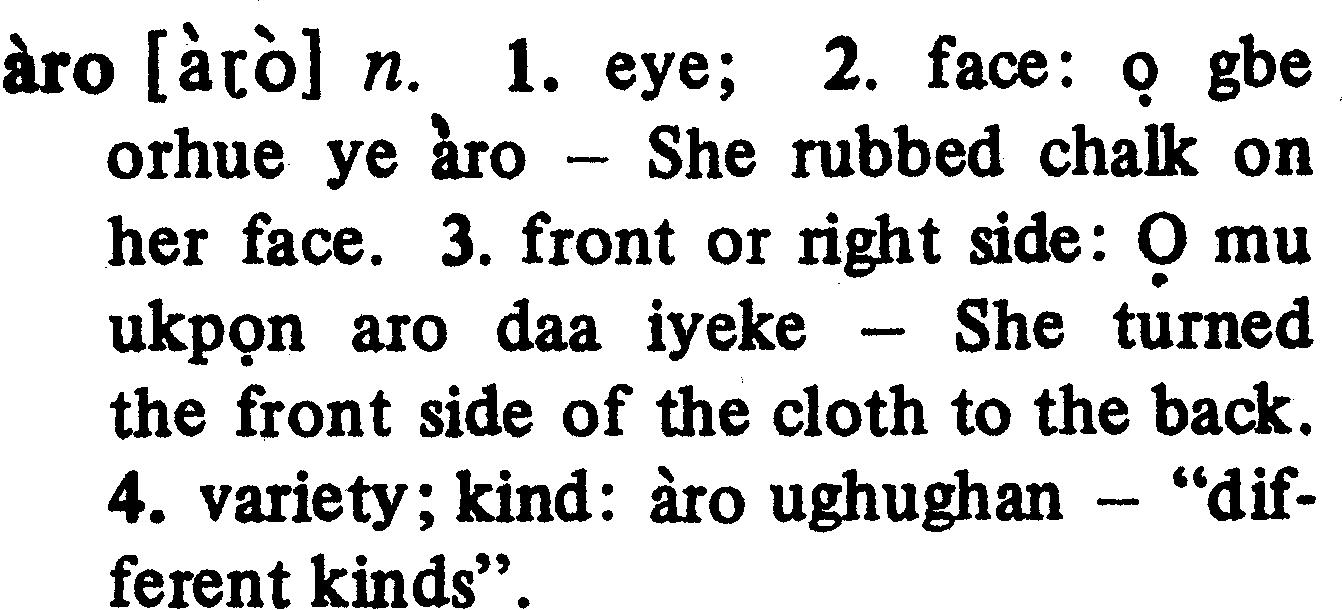
aroegbe [àɽwég͡bè] n. a matching set;
things of the same kind.

aroewu [àɽwéwù] n. hearth.

aroẹrinmwin [àɽwɛ́ɽ̃iɱĩ̀] n. 1. the
shrine at which the rites of ẹrinmwin
(the ancestors) are performed. 2.
(idiom) the brink of death: Emianmwen
ne ọ khuọnmwin kiekie naa, aro-
ẹrinmwin ẹre a ke na ya wọlọ ẹre
rhie ladian ― “This sickness that af-
flicted him lately, it was from the
brink of death that he was saved.”
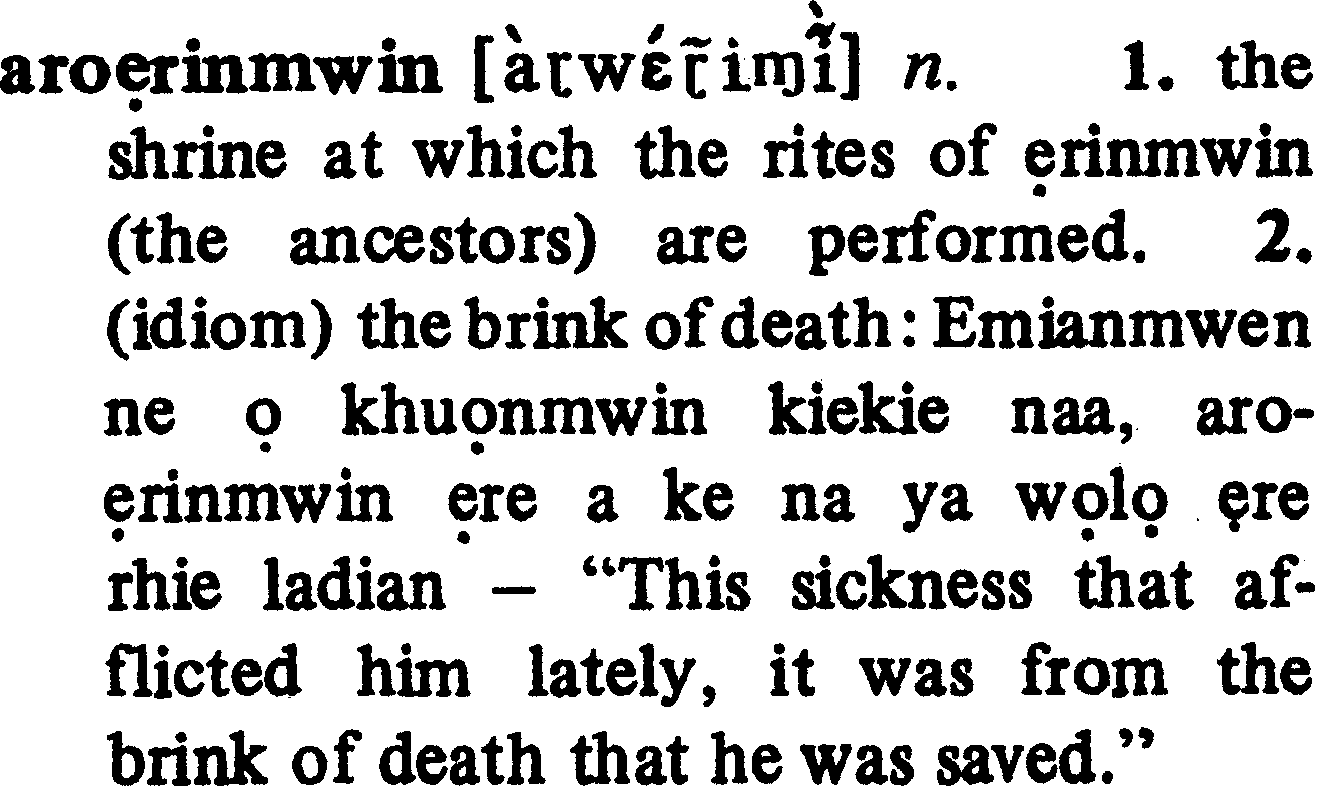
aroẹtẹ [àɽwɛ́tɛ̀] n. the surface of an
ulcer.

aroirofiekhoewerriẹ\[àɽwíɽofyéxɔéwèriyɛ̀] n. repentance
(lit: one-thinks-thought-changes-mind.)

aroọkpa [àɽẁɔ́kpá] adj. of the same
kind: àro ọ́kpa “one variety”; aroọkpa
eveva khin ― “both are of the same
kind”.

aroọma [àɽwɔ́mà] n. good fortune àro
ọma: “^face (of) goodness:” T’u gha
miẹ aroọma: “May you find good
fortune.”
$Page 009$

arovbẹmwẹn [àɽòʋɛ́ɱɛ̃̀] n. greed (aro
+ vbẹ-mwẹn)^: “eye ― wideness”: ọ
mwẹn arovbẹmwẹn gbe ― “he is too
greedy.”

arowa [àɽòwà] n. 1. master, boss. 2.
husband.

arọ [àɽɔ̀] n. cripple; paralysed person.

arọkpa [àɽɔ́kpá] n. oneness; solidarity.

Arúkhọ [àɽúxɔ̀] n. name of the ill-
treated wife of Ogiso in Ẹdo folklore.

arhẹrhẹ [ářɛ̀řɛ́] n. gentle persuasion,
coaxing.

arhiema [àřyémà] n. demonstration,
proof.

arhiọkpaegbe [àřyɔ́k͡paègbé] n. resur-
rection; (Christian sense) Easter.

Arhuanràn [ářw̃ã́ɽã̀] n. name of the
historic giant sized brother of Ọba
Ẹsigie.

arhuaro [àřw̃áɽò] n. a blind person (cf.
afuozu).

arhuẹ [àřwɛ̀] n. circumcision.

arhunmwun [ářṹɱṹ] n. individual per-
son: arhunmwun-ọ́kpa ― “one person”
(also orhunmwun).

arhunmwontọ [ářũ̀ɱṍtɔ̀] n. viper.

arra [àrá] n. a variety of green cater-
pillar, typically found underneath
leaves, and causes extreme irritation
of the skin when one comes into
contact with it.

arrale [áralè] n. a busybody; a gossip.

arriana [àryíanã̀] n. this life, as opposed
to the previous or the next re-incarna-
%%

tion.

arre [árè] n. tradition; cultural history:
emwin-arre ― historical event.

arria [àryá] num. bound variant of uri
(200) which occurs in multiples of
200: arriaigbe ― 2,000 (i.e. 200 x 10).

arriaisẹn [àryáísɛ̃̀] num. one thousand.
arriaisẹn-arriaisẹn ― “one million”.

arriavbehe [àryáʋèhé] n. next rein-
carnation.

arrianusin [àriànṹsĩ̀] n. the previous
life (i.e. before the present one).

arriọba [àryɔ́bá] n. kingdom; govern-
ment.

arriọkpa [àryɔ́kpà] n. the colourful tail
feather of a rooster.

arriukpa [àryìúkpà] n. a variety of
moth that hovers around lamps at
night.

arrọn [àr̃ɔ̃] n. a flaky skin disease
that affects domestic animals such
as goats and sheep.

asa [àsá] n. shield.

asaka [àsákà] n. a variety of large black
ant that troops in a single file and
stings when encountered. It also
gives off a very strong smell when
squashed. asaka-nokhiọnkpa [` ' ` ' ` `][àsákà-
nóxĩɔ̃̀kpà] a variety of black ant
that goes singly. It typically has a
painful sting.
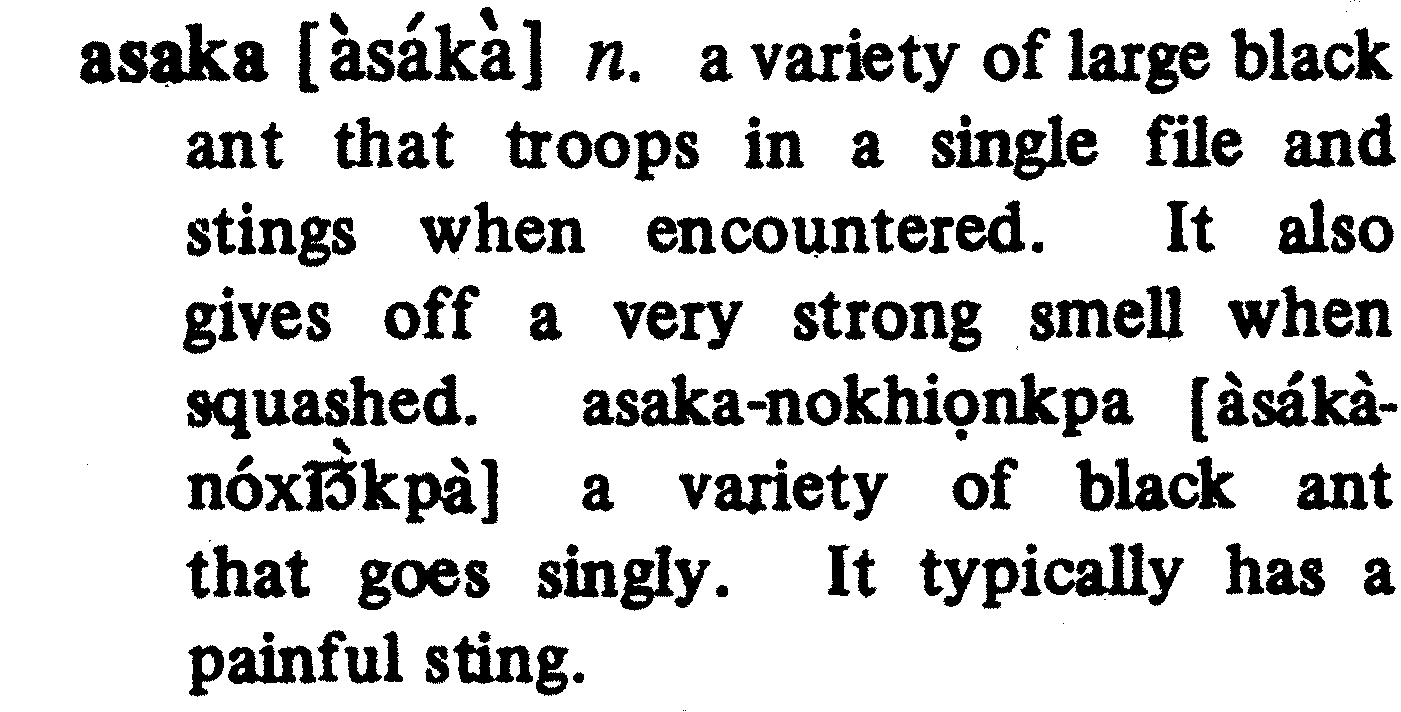
asan [ásã́] n. cane, usually used for
flogging people or animals.

asanikaro [àsàníkàɽò] n. pioneer.

asanmwonto [àsã̀ɱõ̀tò] n. a variety
$Page 010$

of brown ants that troops in large
numbers, and typically collects over
greasy surfaces and left-over foods
in garbage dumps.

ase [àsé] n. state of being in the right
in a case or a quarrel ― Ozo ọ rri-ase
vbe ẹmwẹn naa ― “Ozo is in the right
in this case.”

asefẹn [àsèfɛ̃̀] n. the sides of the human
body.

aseza [ásézà] n. soldier; (possibly from
English: soldier); warrior (also ovbi-
iyokuo).

ásẹ [ásɛ́] n. 1. proximity; environ ―
ásẹ ni ọ rhie ẹre yi ― “It is around
that place that he put it”; ásẹ ni ọ
na ru ẹre ― “It was around that time
that he did it.”

àsẹ [àsɛ́] n. authority.

asẹgiẹ [ásɛ́gyɛ́] n. iron rod used by
farmers for harvesting yam.

asẹlẹ [ásɛ̀lɛ́] n. cricket (also ọsẹlẹ).

asẹn [àsɛ̃̀] n. saliva.

asẹsẹ [ásɛ̀sɛ́] n. a bird: robin.

asimo [ásímó] n. a nickname for a
very lean person.

asokito [ásòkítò] n. hospital (cf.
English: hospital) (variant forms are:
asikito; ọsupito; etc).

asokosagba [ásókósàg͡bà] n. a bikini-
type underwear.

asologun [àsólógṹ] n. xylophone.

asoro [ásóró] n. a spear.

asoso [ásósó] n. a wild fruit that’s very
%%

sweet, borne by a local plant known
as ebiẹba.

asọn [àsɔ̃́] n. night.

asua [àswá] n. bad luck.

asuẹn [áswɛ̃́] n. a shrub (Carpolobia
lutea) whose wood is used for making
the native harp, akpata [' ' '][ákpátá].

asukpẹ [àsùk͡pɛ̀] n. hiccups.

ata [àtá] n. a variety of monkey.

atabatibo [àtàbàtíbó] n. something
that has developed or has been extend-
ed out of proportion: Ọ ya mwẹn
emwẹn khian atabatibo ― “He has
turned my words into an incredible
exaggeration; i.e., he has exaggerated
my words beyond recognition.”
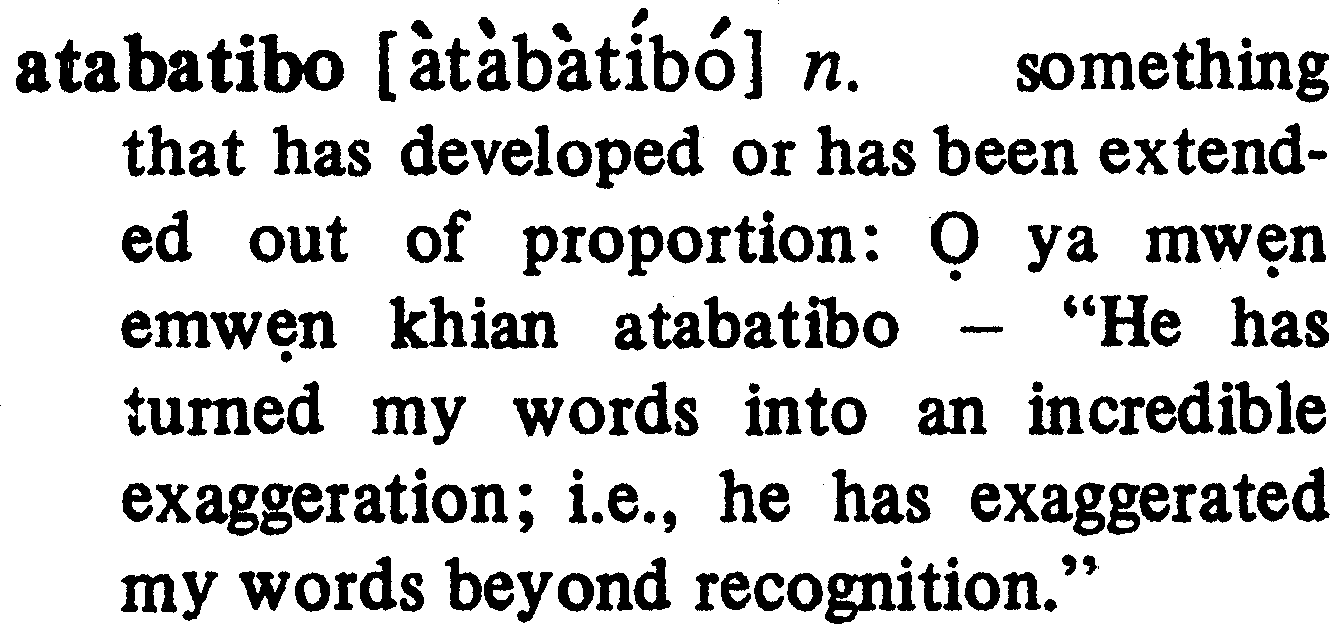
ataighimua [àtáiɣimw̃ã̀] n. a final re-
solution (a-ta-ai-ghi-mua) ― “that which
is said and is not to be debated”^.

ataikpin [àtàik͡pĩ̀] n. a variety of snake,
which is like a boa, but of a smaller
variety.

Atakparhakpa [àtàk͡pářàk͡pà] n. 1.
name of the legendary rogue who
was reputed to be a most skillful
robber: Atakparhakpa ne ogie-oyi ―
“Atakparhakpa, the chief of robbers.”
2. nickname for a thief.
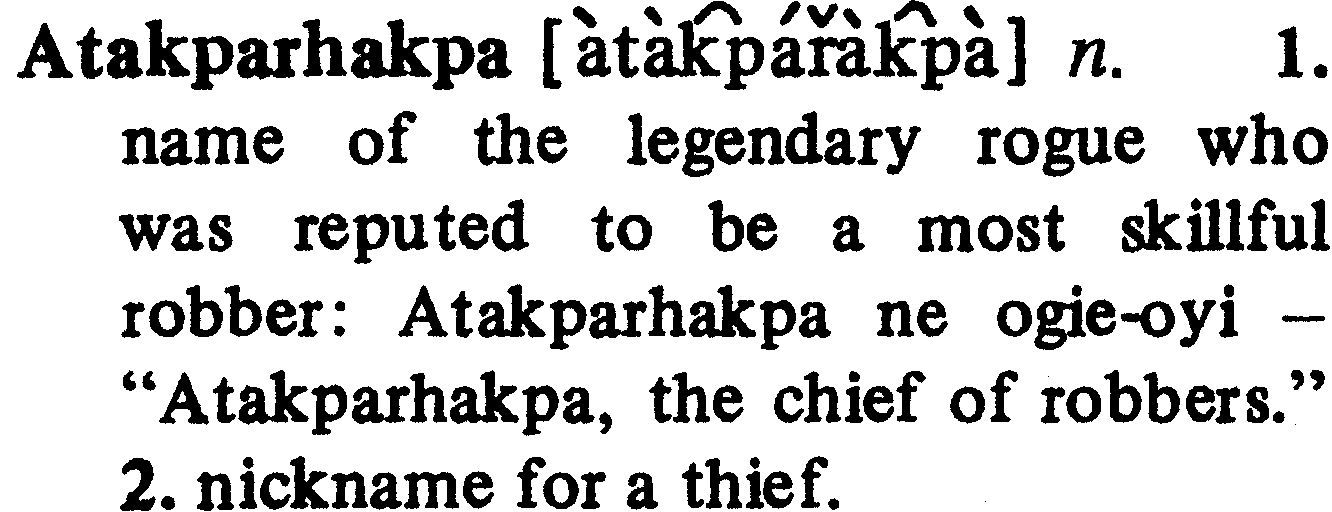
atalakpa [àtàlàkpà] n. leopard.

atalọ [átàlɔ́] n. sore-throat (also aitalọ).

atanunuyan [àtánũ̀nṹỹã̀] n. a nick-
name for a very talkative person (a-
ta-ne-unu-yan): “one who talks till
(his) mouth tires.”

atata- [átátá] bd. n. surface, as in atata-
obọ ― palm (i.e. surface of hand);
$Page 011$

atata-owẹ ― “sole of the feet.”

atauvbi [àtàuʋì] n. the period just be-
fore sunset, characterized by the warm
glow of the setting sun.

ateete [átèétè] n. grasshopper.

atẹ [àtɛ́] n. displayed merchandize, tr-
aditionally on cane trays (atẹtẹ) in
the market place.

atẹtẹ [àtɛ̀tɛ̀] n. the traditional cane tray
on which merchandize, such as pepper,
crayfish, etc., is displayed in measured
portions for sale in the market place.

atiebi [àtyèbì] n. a large insect that
typically makes its characteristic calls
at dusk; hence its name, which literal-
ly means: “caller of darkness”.

atimakasa [àtìmàkásà] n. antimacassar
a crotchetted covering thrown over
chairs and other pieces of furniture
as protection from grease or as an
ornament. (cf. English).

atita [àtítá] n. childish term for
“meat”.

ato [àtó] n. grassy plain; savana.

atọrhi [àtɔ̀ří] n. gonorrhoea.

atọwọ [àtɔ̀wɔ̀] n. whitlow on the
finger, believed to be caused by the
poison of the caterpillar, isue.

atugiẹn [àtùgỹɛ̃́] n. a variety of
monkey.

ava [àvá] n. wooden or iron wedge used
for splitting wood.

àvan [àvã̀] n. 1. afternoon; 2. day-
light (as opposed to asọn ― night-
time).
%%

aván [àvã́] n. thunder and lightning;
also avan-nukhunmwun.

aviẹn [àvỹɛ̃́] n. clitoris.

avbe [áʋé] spec. 1. it precedes nouns
or pronominals in the plural to express
specificity: avbe ikpia nii ― “those
particular men”; Vs. ikpia nii ― “those
men”; avbe iran ― “those ones” Vs.
iran ― “they”. 2. serves as an optional
plural marker with nouns, esp. those
that do not mark plural morphol-
ogically: iyan nii ― that yam or those
yams; avbe iyan nii ― those yams.
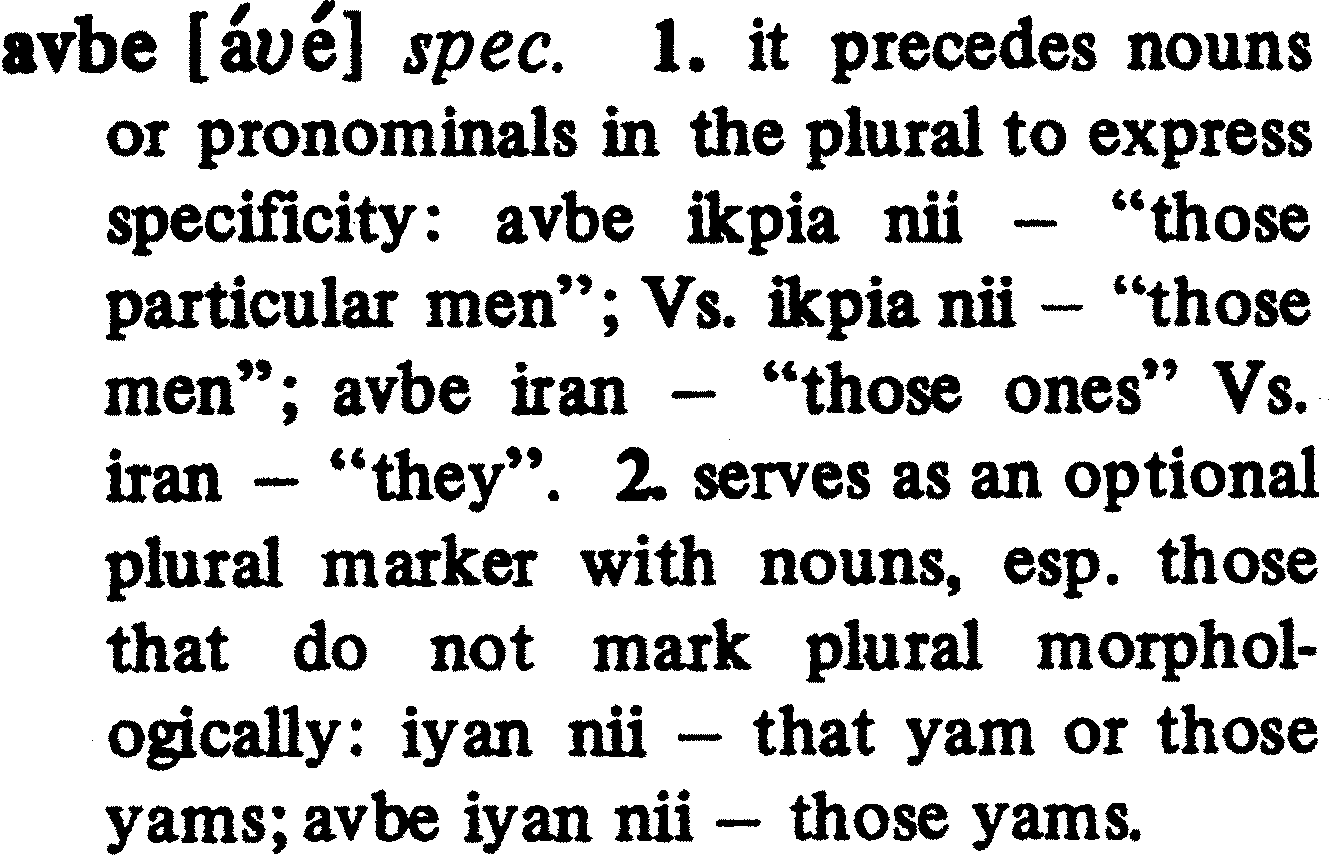
Avbiama [àʋyámá] n. the name of an
Ẹdo-Speaking village.

avbiẹ [àʋyɛ́] n. few or of limited qu-
antity: igho ne ọ mwẹn ― i-re avbiẹ
― “the money that he has is limitless”.

avbiẹrẹ [àʋiɛ̀ɽɛ̀] n. 1. a coward; a
weak person.

àwa [àwá] n. dog (also ekita; ovbiakota).

áwa [áwà] n. hour (cf. Engl. hour).

awan [àwã́] n. tongs.

awanwan [áw̃ã̀w̃ã̀] n. brightness, light.

awarọkpa [àwàɽɔ́kpá] adv. immedi-
ately; at once (also ọwarọkpa).

áwẹ [áwɛ́] n. a large bird with a tuft
on its head.

àwẹ [àwɛ̀] n. a fast, usually associated
with the Muslim religion.

awua [àwwà] n. taboo.

awuekia [àwwékyà] n. impotent man.

ayaengbọmwan [àyáeg͡bɔɱã̀] n. 1^.^ in-
dependence (in the political sense);
$Page 012$

2. freedom from apprenticeship.

aye [áyé] n. world.

ayegbema [àyégbémà] n. self-betrayal.

ayegbemiẹ [àyégbemỹɛ̃̀] n. endur-
ance.

ayere [àyèɽè] n. memoriam; remembr-
ance.

ayi [áyì] n. creation; nature.

ayighẹ [áyíɣɛ́] n. a weakling; also
ayinghẹn.

ayintọ [àỹítɔ̀] n. (a-yin-tọ) ― “dwelling
with longevity” a traditional greeting
expressed to somebody who has just
completed either the foundation of a
residence or the entire building, to
wish him long life.
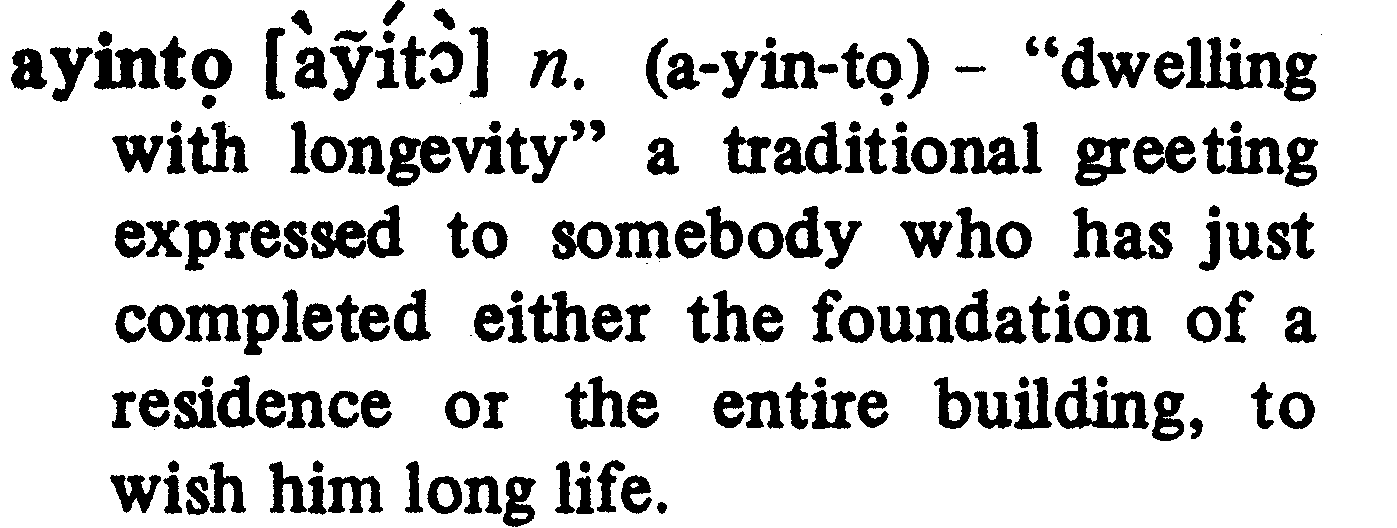
ayọ [áyɔ̀] n. the norm; the usual mo-
deration; it is usually preceded by
the comparative verb sẹẹ: ọ rhiẹnrhiẹn
sẹẹ ayọ ― it is sweet surpassing mo-
deration, i.e. “it is extremely sweet”.

ayenhọ [àyẽ́hɔ̀] n. 1. a deaf person; 2.
(idiom) a stubborn person.

àyọn [àyɔ̃́] n. 1. wine; 2. beverage; 3.
alcoholic drink.

áyọn [áyɔ̃̀] n. black rubber tree.
%%

ayọnni [áyɔ̃̀nĩ̀] n. pressing iron (cf.
English: iron).

aza [ázà] n. 1. store-room in the house;
2. bank.

azagba [àzàgbà] n. the open; a public
place: ghẹ talọ ẹmwẹn mwẹn sẹ azagba
― “don’t announce my affairs to the
open, i.e. keep my affairs secret.”

Azama [àzámà] n. the name of a deity
of the Ọba, said to have been an
historic royal courtier.

azanna [àzã̀nã̀] n. boar (bush and do-
mestic).

azebe [ázébè] n. library (aza ebe)
“bank of books”.

azẹ [àzɛ́] n. fee; contribution; levy.

azẹn [àzɛ̃́] n. witch.

azi [ázì] n. adze (cf. Engl.).

azigan [àzìgã́] n. jiggar (cf. English:
jiggar).

ázigho [ázíɣó] n. (aza-ígho) “store of
money”: commercial bank.

àzigho [àzíɣò] n. stag bettle.
